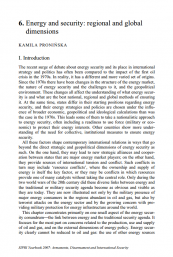
Energy and Security: Regional and Global Dimensions

Summary (excerpt)
Efforts to secure energy supplies are an important factor shaping states’ foreign policy and foreign relations. Many features of the international environment influence the conceptualization of energy security and thinking about what are the best national, regional and global methods to ensure it.
The recent intensification of debate about energy security has been motivated by the rising global demand for energy, a tight oil market, high oil prices, rising dependency on energy imports, and the prospect of future scarcity of oil and gas. Concerns have also been exacerbated by external events such as terrorist attacks on energy infrastructure, power blackouts in some cities and instability in some energy-producing countries. All these factors have heightened awareness in both energy consumer and producer countries of the many new challenges and threats to their energy security in the near future. In response to these challenges, some countries have adopted a nationalistic approach to energy security, even going as far as being ready to use force—military or economic—to protect their energy interests. Others have shown more understanding of the need for collective, institutional measures.
Energy security concerns shape contemporary international relations in ways that go beyond the direct strategic and geopolitical dimensions of energy security as such. On the one hand, they lead to new strategic alliances and cooperation between states that are major energy market players; on the other, they are sources of international tension, rivalry and conflict, due mainly to the divergent energy interests of:
• consumer countries and greater competition between them in world energy markets;
• consumer–producer relations and fears that energy supply will be used as a weapon; and
• disputes over ownership of energy resources.
- Issues:
- Infrastructure, Energy, Natural Resources
- Region:
- Global
- Year Published:
- 2006
- Author:
- Kamila Proninska
- Institution:
- Stockholm International Peace Research Institute (SIPRI)

